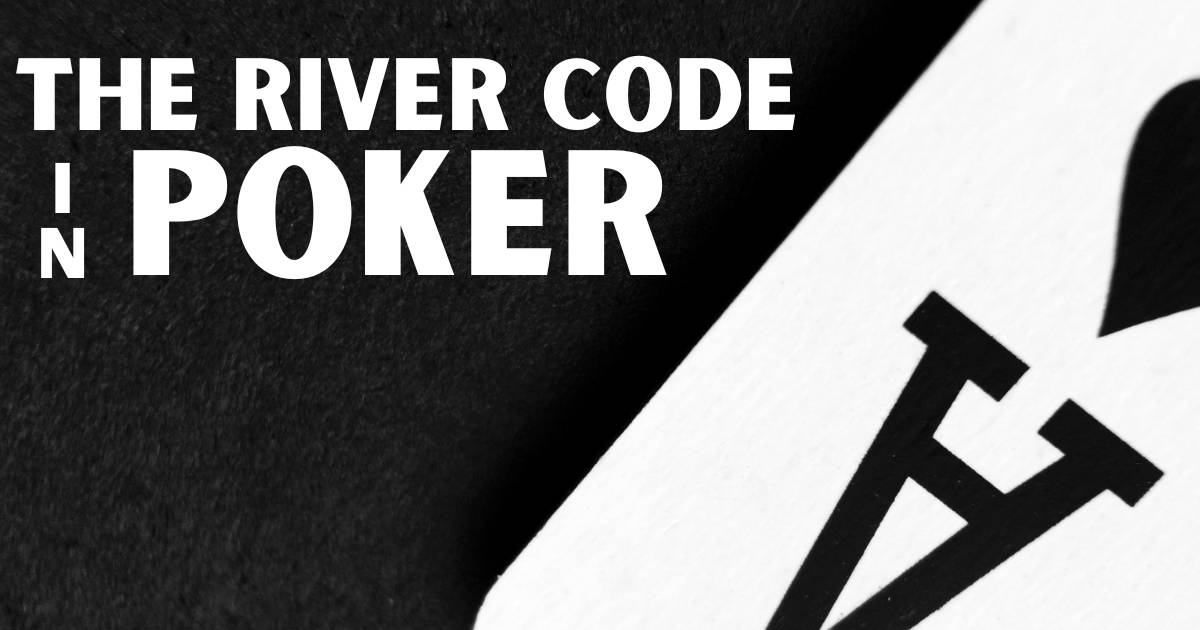Welcome to the world of Texas Hold’em poker, where every card, every bet, and every move counts. Among all the cards dealt in a poker hand, one card holds a special mystique—the river card. In this blog post, we’re going to unravel “The River Code” and explore the intricacies of reading and interpreting the final card on the board. By mastering this art, you can gain a significant advantage in Texas Hold’em and elevate your poker game to the next level.
Table of Contents
The Significance of the River Card

The river card, also known as the “fifth street,” is the last community card to be revealed in a Texas Hold’em hand. It is often the final opportunity for players to improve their hands or bluff their opponents. Understanding its significance is crucial for making informed decisions at this critical stage of the game.
Think of the river card as the climactic moment in a suspenseful movie. It’s the moment of truth in Texas Hold’em, where fortunes can change in an instant. It can transform a losing hand into a winning one or shatter the dreams of a hopeful player. But to make the most of it, you need to decipher “The River Code.”
The Art of Observation
To decode “The River Code,” you must develop keen powers of observation. Paying close attention to every detail at the poker table is your secret weapon. Here’s how to sharpen your observation skills:
- How to Read Opponent Behavior: Begin by watching your opponents. Are they relaxed or tense? Do they appear delighted or worried? These small indications can reveal important information about their hand strength.
- Recognizing Patterns: Poker is a pattern-recognition game. Throughout the hand, pay attention to your opponents’ betting habits. Have they acted consistently aggressively or with restraint? Understanding these patterns might help you predict their movements on the river.
- Prior Betting Rounds: Remember the lessons learned from prior betting rounds. Did an opponent check when they normally bet, or raise when they normally fold? These departures from their normal behavior might be instructive
The River Card Analysis

Now, let’s dive into the heart of “The River Code”—analyzing the final card. Here’s how to approach it:
- Break It Down: Take a moment to break down the river card’s implications. What potential hands could it complete or improve? Is it a high card, a low card, or a connector? Assess how it fits into the overall board.
- Player Action: Pay close attention to how your opponents react to the river card. Did they check, bet, or raise? Their actions can tell a story about the strength of their hands.
- Pot Size: Consider the size of the pot and the size of bets made on the river. Are your opponents betting conservatively or aggressively? This can provide clues about their confidence in their hands.
Reading Your Opponents
One of the keys to decoding “The River Code” is reading your opponents effectively. Here’s how to do it:
- How to Read Opponent Reactions: Look for physical and emotional reactions when the river card is revealed. Are there sudden changes in body language, facial expressions, or breathing patterns? A nervous tic or a subtle smile could be revealing.
- Common Tells: Keep an eye out for common tells, such as a player glancing at their chips (a sign of strength) or avoiding eye contact (a sign of weakness). However, be cautious; some players are skilled at disguising their tells.
- Bluff or Strong Hand? Consider whether your opponent is likely to bluff on the river or if they genuinely have a strong hand. Analyze their previous actions in the hand to make an informed judgment.
Psychological Warfare on the River
“The River Code” isn’t just about deciphering cards; it’s also about using psychological tactics effectively. Here’s how to wield psychological warfare on the river:
- Timing is everything in poker, especially on the river. Take into account the timing of your bets and decisions. A well-timed raise might cause your opponents to question you.
- Reaction Induction: Skilled players can elicit certain emotions from their opponents. For example, if you want your opponent to fold, you may make a confident bet to make them doubt their hand.
- Strategic hostility: On the river, well-timed hostility may be a formidable weapon. Bluffing with a large bet can force opponents to fold even if they hold a strong hand.
Texas Hold’em Advanced Techniques
Now that you’ve gained insight into the basics of “The River Code,” let’s explore some advanced techniques for decoding it:
- Blockers: Advanced players consider blocker effects. If you hold cards that block certain strong hands, your opponent is less likely to have those hands.
- Equity: Calculate your equity on the river to determine whether calling a bet is profitable in the long run. If your equity exceeds the size of the bet, it may be a favorable call.
- Pot Odds: Understanding pot odds on the river can help you make informed decisions. If the pot odds are better than your drawing odds, it may be worth calling a bet.
The River Code Unveiled
As we wrap up our journey into “The River Code,” let’s recap the key takeaways:
- The river card is a game-changer in Texas Hold’em, and understanding its significance is crucial.
- Developing strong observation skills and reading opponents’ behavior is essential for deciphering “The River Code.”
- Analyzing the river card’s implications and assessing player actions can guide your decisions.
- Reading your opponents’ reactions and using psychological tactics effectively can give you an edge.
- Advanced techniques, such as considering blockers, equity, and pot odds, can enhance your river play.
In mastering “The River Code,” you become a more formidable poker player, capable of making calculated decisions on the final card that can lead to victory. The river card is no longer a mystery; it’s your tool for strategic advantage.
Conclusion

As you continue your Texas Hold’em journey, remember that “The River Code” is not a one-size-fits-all solution. It’s a dynamic aspect of the game that evolves with each hand and each opponent. Practice, observation, and experience will sharpen your skills in deciphering “The River Code.” Embrace the challenge, trust your instincts, and let the river lead you to victory in the exciting world of Texas Hold’em poker.
If you want to know how to make the perfect C-bet after a flop, you can read our blog about it here.
FAQs
Q1: What is the river card in Texas Hold’em, and why is it important?
A1: In Texas Hold’em, the river card is the fifth and final community card to be revealed on the board. It’s important because it can drastically alter the outcome of a hand, making it a critical moment for players to make strategic decisions.
Q2: How can I improve my ability to read my opponents on the river?
A2: Improving your ability to read opponents on the river takes practice and observation. Pay attention to their behavior, betting patterns, and any subtle tells they may have. Additionally, consider their actions throughout the hand to deduce their likely hand strength.
Q3: Are there any specific tells or behaviors that indicate a strong hand on the river?
A3: While there are no universal tells, certain behaviors can suggest a strong hand. Confident betting, a steady gaze, and a lack of hesitation can all indicate strength. However, keep in mind that experienced players may use reverse tells to deceive opponents.
Q4: When should I consider making a hero call on the river?
A4: Making a hero call on the river should be based on a combination of factors. If you have a strong read on your opponent, believe their story doesn’t add up, and have a hand that can beat their likely range, it may be a good time to make a hero call. However, exercise caution, as it can be a high-risk, high-reward move.
Q5: What are some common mistakes to avoid when playing the river in Texas Hold’em?
A5: Common mistakes on the river include overvaluing your hand, failing to recognize strong opponent hands, and misinterpreting their behavior. It’s also a mistake to become too predictable in your own river play. The key is to stay adaptable and make informed decisions.
Q6: How can I practice and improve my river play skills?
A6: To improve your river play, consider studying poker strategy books, watching professional Texas Hold’em games, and participating in online or live poker games. Experience and practice are invaluable for honing your skills in deciphering “The River Code.”
Q7: Are there any tools or software that can assist with river card analysis in Texas Hold’em?
A7: Yes, there are various Texas Hold’em poker software tools and apps that can help with river card analysis, equity calculations, and odds calculations. These tools can be useful for refining your decision-making process on the river.
Q8: What should I do if I suspect an opponent is bluffing on the river, but I’m not entirely sure?
A8: If you suspect a bluff but aren’t entirely sure, consider your own hand’s strength and your opponent’s betting history. If calling the bet won’t significantly harm your chip stack and you believe there’s a reasonable chance your opponent is bluffing, making the call may be justified.
Q9: How can I avoid giving away tells on the river when I’m bluffing in Texas Hold’em?
A9: To avoid giving away tells when bluffing on the river, practice maintaining a consistent demeanor regardless of your hand strength. Keep your behavior, betting patterns, and timing consistent to avoid arousing suspicion.
Q10: Is “The River Code” applicable to all forms of Texas Hold’em, including tournaments and cash games?
A10: Yes, “The River Code” principles are applicable to all forms of Texas Hold’em, whether you’re playing in a tournament or a cash game. Understanding how to decipher the river card and read opponents is essential in all variations of the game.
Feel free to ask any more questions or share your thoughts in the comments below, and let’s continue exploring the fascinating world of Texas Hold’em poker!
Explore our collection of Blogs for a variety of Card Games-related content.
- UNLOCKING THE NIUNIU TREASURE: HOW TO CALCULATE PAYOUTS
- SECRETS OF BACCARAT MASTERS: THE ART OF WINNING ACROSS ALL VARIATIONS
- JOIN THE CRAZY TIME CASINO ELITE: MASTERING THE GAME’S BEST-KEPT SECRETS
- WHY LUCKY 9 IS THE MUST-TRY CARD GAME OF THE YEAR
- THE ART OF BLUFFING: HIDDEN GEM’S OF ONLINE POKER
- PUSOY GAMES: HOW TO WIN PUSOY DOS SUDDEN-DEATH MATCHES WITH PANACHE
- WILD CARD WISDOM: HOW TO AVOID TONGITS MISTAKES AND DOMINATE THE GAME



